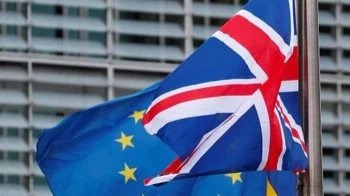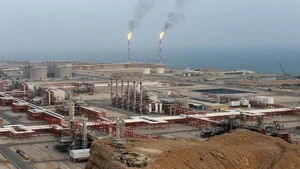This is considered a step in the right direction, because the Land of Fog still has an inseparable connection with the EU, especially in terms of economics, even though it is no longer a member of the European Union.
Recently, in an interview with the press in Geneva (Switzerland), Douglas Alexander, UK’s Minister of State at the Department for Business and Trade, said that Britain's 2016 vote to leave the EU caused "significant disruption" to its trade policy and the country needed to recalibrate its global trade outlook.
"It's a reality that 47 percent of the UK's trade is still with the EU. So, there is an urgency to resetting our relationship," said Alexander.
October 12 marked the first 100 days of the new UK Government's administration. During this important period, British Prime Minister Keir Starmer clearly demonstrated his determination to re-establish friendly relations with EU countries, thereby finding solutions to loosen trade barriers and restrictions created by Brexit.
Politico magazine commented that Keir Starmer took advantage of opportunities for dialogue with EU leaders, notably meeting with German Chancellor Olaf Scholz five times and French President Emmanuel Macron four times.
In particular, the visit to the headquarters of the European Commission (EC) by the head of the British Government in early October 2024 is considered to have opened a new chapter in the relationship between the two sides of the English Channel.
Recently, the British Government also scored points with its first major foreign policy achievement in the post-Brexit period, when it completed a landmark defence agreement with Germany, a highly influential member of the EU.
Unlike previous conservative governments, the government led by the Labour Party in the UK aims to change its approach to relations with the EU and has taken strong, practical steps amid increasingly unstable geopolitical situations.
More than four years after the UK officially left the "common EU home" in January 2020, most experts and British people now believe that Brexit has resulted in significant consequences for the economy of this European country.
John Springford, from the Centre for European Reform Studies (UK), commented that the missed growth in trade in goods and services due to Brexit caused UK exports to lose about 23 billion pounds per quarter, equivalent to a decrease of about 4%-5% of GDP compared to the level if the UK remained in the bloc.
In addition, the UK's labour supply is also tightening as Brexit ends free movement from the EU. London Mayor Michael Mainelli said that there were 525,000 workers in London in 2016 and the city lost nearly 40,000 workers after Brexit.
Therefore, the UK's resumption of relations with the EU is necessary, in the context that the ruling Labour Party considers economic growth as the top priority.
On the EU side, EC President Ursula von der Leyen affirmed that the EU wants the UK to fully comply with its Brexit obligations before considering improving trade conditions and called on all parties to seriously implement the Brexit Agreement, the Windsor Framework, and the Trade and Cooperation Agreement (TCA).
The first summit between the EU and the UK after Brexit will be held in early 2025. Although both sides expressed their goodwill to improve relations, the leaders of both sides acknowledged that there is still much to do to build a long-term and effective cooperative relationship in the challenging post-Brexit context.
British Prime Minister Keir Starmer must shoulder the complex task of managing the country in the post-Brexit period with a series of consequences from the "historic breakup" between the UK and the EU.
Having committed not to consider the UK returning to the EU single market or restoring free movement between the two sides, the British Prime Minister affirmed that he is aiming to "make Brexit work".
Efforts to mend the UK-EU relationship are also part of the broader strategy of Prime Minister Keir Starmer's government to increase the UK's position in the international arena.
















